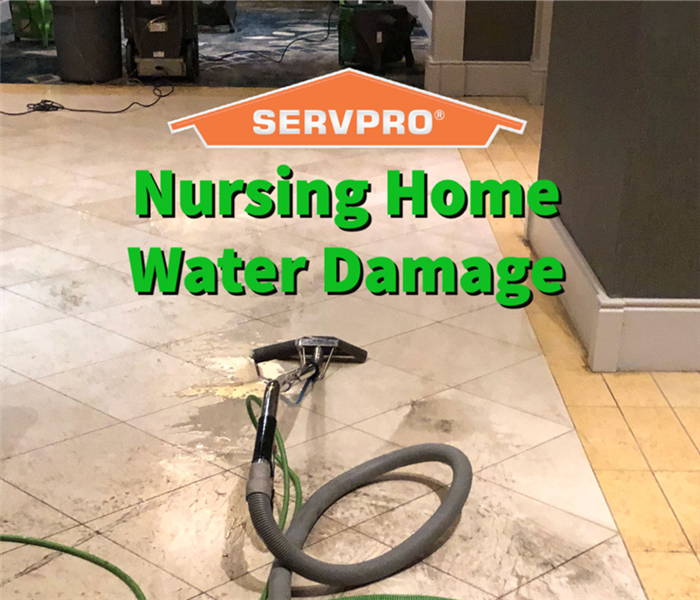Nursing Home Water Damage: Avoid The #1 Most Costly Mistake
2/27/2023 (Permalink)
Nursing home water damage can occur regardless of the care facility’s age.
Last month, the professionals at SERVPRO of North Fulton received a service call after a pipe burst in a nursing home in nearby Alpharetta. The building was built in the 1970s and suffered from poor plumbing repair and maintenance for decades.
Unfortunately, this example of nursing home water damage resulted in severe consequences because the property owner didn’t mitigate the resulting deterioration promptly. As a result, when our professionals arrived on site, we found that mold growth had weakened the structural integrity, creating hazardous conditions for the elderly and staff living and working within the facility.
Mold is one of the most common post-damage effects properties face when water isn’t removed in a timely fashion. The recent nursing home water damage has influenced the creation of this blog post because we strongly urge nursing home owners, facility managers, and staff to be aware of the dangers nursing home water damage can bring.
In the following blog post, we will address the key steps nursing home owners, facility managers, and staff should take to ensure the nursing home water damage does not cause severe consequences.
What is nursing home water damage, and what are the common causes?
Nursing home water damage is a type of damage that can occur in nursing homes and other care facilities due to water intrusion. Common causes of nursing home water damage include:
- Leaking pipes
- Faulty plumbing systems
- Roof leaks
- Overflowing showers or toilets
- Heavy rainstorms and flooding
- Fire suppression system malfunctions
When nursing home water damage occurs, it is essential to act quickly to prevent the growth of mold and other secondary damage.
Steps to take when nursing home water damage occurs
The professionals at SERVPRO have put together the following steps for nursing home staff to take when water damage occurs.
Step 1) Shut off the water supply if it’s a plumbing issue: Immediately shut off the main water supply to stop additional water from entering the nursing home. Shutting off the water supply line will help to prevent further property damage and save on costly repairs in the long run.
Step 2) Contact your property insurance company: Contact your property insurance company as soon as the nursing home water damage occurs. The sooner you contact your insurance company, the greater the chance that the nursing home is covered for damages.
Step 3) Call a professional water restoration company: A care facility is no place for DIY solutions regarding nursing home water damage. It is essential to call a professional water mitigation company for the most effective and efficient water damage restoration solutions. A good team of professionals will:
- Remove standing water: It is essential to remove any standing water in the nursing home quickly to prevent mold growth and other secondary damage.
- Dry the affected areas: Once all the standing water has been removed, drying the nursing home using industrial fans and dehumidifiers as quickly as possible prevents mold growth.
- Disinfect and sanitize the nursing home: Because nursing home residents are at a higher risk for infection and disease, it is essential to disinfect and sanitize all affected areas of the property after nursing home water damage.
- Address any structural damage: Lastly, it is necessary to address any structural damage that may have occurred during the nursing home water damage.
The professionals at SERVPRO are here to help.
Nursing home water damage can be dangerous for older adults and staff alike because it can lead to mold growth, weakened structural integrity, and an increased risk of infection. Therefore, nursing home owners, facility managers, and staff must quickly mitigate nursing home water damage to prevent further property damage and prevent costly repairs.
The professionals at SERVPRO are here to help nursing homes address any water damage issue they may have using their expertise in removing standing water, drying affected areas, disinfecting & sanitizing surfaces, and addressing structural damages if needed. Taking proactive measures like checking for signs of water damage and calling the professionals at SERVPRO if it occurs can help ensure your home remains safe and secure for its staff and residents. Contact us today to learn more about our commercial water restoration services and how we can help you!





 24/7 Emergency Service
24/7 Emergency Service
